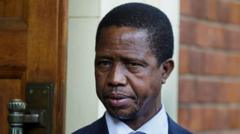The reevaluation comes as part of a broader strategy to bolster national security and prevent visa misuse, according to government officials.
US Moves to Reassess 55 Million Visas Amidst Immigration Crackdown

US Moves to Reassess 55 Million Visas Amidst Immigration Crackdown
The US government is initiating a comprehensive review of visa holders in a significant anti-immigration effort.
The US administration is embarking on a meticulous review process that encompasses around 55 million visa holders, scrutinizing their compliance with the conditions linked to their visas. The initiative, framed as part of ongoing immigration reforms, includes implementing continuous vetting for current visa holders. This means that anyone found in violation of their visa terms, whether through overstays, criminal activities, perceived threats to public safety, or any connection to terrorism, risks having their visa revoked, according to statements from a State Department spokesperson.
Under President Donald Trump's administration, the focus on restrictive immigration policies has intensified, shaping his agenda since taking office. Central to these policies are aggressive measures ranging from mass deportations to various country-specific travel bans, which have included the cancellation of thousands of student visas. In a recent announcement, Secretary of State Marco Rubio emphasized new measures targeting the influx of foreign truck drivers, claiming they jeopardize American lives and livelihoods.
Additionally, the vetting process will now include an analysis of social media activities for potential indicators of anti-American sentiment or support for hostile ideologies. Immigration officials are directed to identify individuals who exhibit affiliations with designated terrorist organizations or engage in anti-Semitic actions, reinforcing the administration's commitment to national security.
As part of this clampdown, the administration revealed plans to require significant financial deposits from prospective tourists from countries like Malawi and Zambia, further tightening the scrutiny on immigration. The impact of these policies has been stark, with numerous students facing legal troubles for participating in protests reflective of broader international tensions, particularly relating to the situation in Gaza.
Trump’s strategies have also encompassed a ban on travelers from specific nations, alongside temporary revocation of the legal status of many migrants residing in the US, sparking significant debate on the future of immigration in the country.
Under President Donald Trump's administration, the focus on restrictive immigration policies has intensified, shaping his agenda since taking office. Central to these policies are aggressive measures ranging from mass deportations to various country-specific travel bans, which have included the cancellation of thousands of student visas. In a recent announcement, Secretary of State Marco Rubio emphasized new measures targeting the influx of foreign truck drivers, claiming they jeopardize American lives and livelihoods.
Additionally, the vetting process will now include an analysis of social media activities for potential indicators of anti-American sentiment or support for hostile ideologies. Immigration officials are directed to identify individuals who exhibit affiliations with designated terrorist organizations or engage in anti-Semitic actions, reinforcing the administration's commitment to national security.
As part of this clampdown, the administration revealed plans to require significant financial deposits from prospective tourists from countries like Malawi and Zambia, further tightening the scrutiny on immigration. The impact of these policies has been stark, with numerous students facing legal troubles for participating in protests reflective of broader international tensions, particularly relating to the situation in Gaza.
Trump’s strategies have also encompassed a ban on travelers from specific nations, alongside temporary revocation of the legal status of many migrants residing in the US, sparking significant debate on the future of immigration in the country.



















